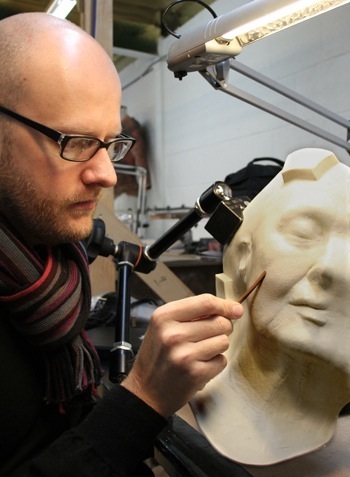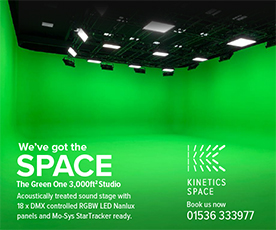Transforming Meryl Streep
 With a career spanning over 16 years, make-up effects artist Barrie Gower has worked on films such as Saving Private Ryan, The Wolfman and The Iron Lady. He is the founder of BGFX, which specialise in prosthetic make-up design for film and television.
With a career spanning over 16 years, make-up effects artist Barrie Gower has worked on films such as Saving Private Ryan, The Wolfman and The Iron Lady. He is the founder of BGFX, which specialise in prosthetic make-up design for film and television.
How did you become a make-up effects artist?
As an avid fan of make-up effects and monster movies from an early age, I always wanted to pursue a career in this field. After leaving art college, I enrolled on a HND make-up course at The London College of Fashion where I was taught by several leading prosthetics designers, including Mark Coulier and Geoff Portass.
On completion of the course, I was lucky enough to meet BBC visual effects designer Paul McGuiness, who took me under his wing for several months at the BBC's in house VFX department.
I cut my teeth on shows such as Red Dwarf and Silent Witness. Work sort of snowballed from there and I got the opportunity to work for many of the leading make-up effects companies such as Weta Workshop and Coulier Creatures FX.
What are the main challenges of your role?
I think staying true to the director or make-up designer's brief as close as possible with budget and time constraints. If I'm on a long shoot with an actor wearing an extensive prosthetic make-up, it’s to make the process as enjoyable as possible. It’s important to have a good working relationship with your artist, as you're likely to be the first and last person they see at work each day.
Also keeping a happy balance of work and family life, as the hours can be very long. I am very fortunate to have a wife who works in the film industry and understands the long hours.
What’s the most challenging job you’ve ever worked on?
Oooh, I could list so many! I think the highest maintenance job I've worked on was an adaptation of The Nutcracker. We shot in Budapest in the middle of a heat wave. I had a gelatine nose/mouth prosthetic on my actor and it was 120 degrees on set with no air con for the most of it. Nightmare! Apart from melting prosthetics, I would match the appliance to his skin at the start of the day, he would step on set and the rest of his face would go bright red due to the temperature, leaving a great big yellow nose in the middle of his face. Constant touch ups, constant headache.
What’s your most enjoyable job you’ve worked on?
Again, I've got a long list of projects I've loved. It's usually the lower budget, more personal jobs that I get more out of. I think The Iron Lady was a highlight. I got to work for my friend Mark Coulier, for whom I sculpted the elderly Margaret Thatcher make-up for Meryl Streep and applied it every day with Mark.
Meryl was an absolute joy - so professional, patient and very funny. Phyllida Lloyd was a lovely director too. She created a great atmosphere on set and was sure to pop into our trailer every night and compliment our work.
How is your job changing?
There's definitely been a shift in recent years of what type of effects productions like to use. With the advent of CGI, a lot of our animatronic work has suffered. Harry Potter was a perfect example. Digital effects can definitely provide the filmmakers with more flexibility in post-production, as they don't have to commit to the design of an animatronic creature or be constrained to its performance.
I think in monetary terms, prosthetics are still considerably cheaper than CGI and more successful for character make-ups. Our materials have taken a dramatic leap in the last decade. Translucent silicones have enabled us to produce more life-like appliances, which move and look incredible.
What key skills do you need to become make-up effects artist?
You definitely need an artistic background. I have friends who have fallen into this role accidentally, former graphic designers and model makers, but they all have a good eye for colour and strong sculptural skills.
Patience is very important too. Some of the more extensive make-ups can take 6 to 8 hours to apply. One of my colleagues had a 00:30 call once, to get an actor ready for set at 9am. Living the dream!
What advice would you give to someone wanting to become a make-up effects artist?
Study anatomy and form. Reference is so important when creating a prosthetic make-up, be it realistic or fantasy. There are some really good courses around now which can give you lots of knowledge of techniques and materials and are a great foundation for a career in make-up effects.
The internet is a great source of information that I didn't have when I was training - there are many FX forums that offer advice, techniques and list materials, and where to buy them.
I would recommend contacting as many prosthetic designers / make-up FX companies as possible and enquire about work experience and trainee positions. I remember towards the end of my course, trawling through The Knowledge and calling every listing in the prosthetics section. It's the perfect way to meet the right people and network.
If you could meet a version of yourself right at the start for your career, what’s the one piece of advice you would give yourself?
'Don't do the Nutcracker!' That's a lie, I met my wife on that job which made it one of the best projects too. I think I would say to always persevere and strive to do the best work possible as this is an incredibly competitive field.
To find out more about Barrie and his work, please visit his profile on The Knowledge.


